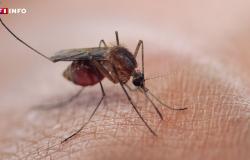The West Nile Virus is indeed present in Guadeloupe and has been for over 20 years. The general public has recently become aware of it, while horses are paying the price for this vector-borne disease, transmitted in particular by mosquito bites; three equines have recently died. The virus can also be transmitted to humans, in rare cases, according to what is observed locally.
West Nile virus (WNV), also known as West Nile fever, is responsible for the Death of at least three horses in GuadeloupeThis disease was detected in the archipelago in 2002. ; the contamination already concerned equines at the time. Then the epidemics followed one after the other.
Then, at the beginning of August, for the first time, a man was infected locally.
ALSO READ: West Nile virus: first human case detected in Guadeloupe – 08/08/2024.
One of the deceased animals was a resident of the La Martingale Equestrian Center. He was affected by VWN while he was “on vacation” on another site, in Goyave.
However, the teams at La Jaille in Baie-Mahault are vigilant to prevent any new tragedy.
At La Martingale, we have put several measures in place. We try to fight as much as possible against the spread of mosquitoes… at all times, but now, during the virus period, even more so. We use repellent products, blankets for certain horses and we remain quite vigilant. We know our horses, we know when they are well, when they are not well. We take the horses’ temperature, which is a sign of infection (…).
Benoît Bonfils, president of the equestrian association La Martingale

•
©Bruno Pansiot-Villon
Weakened animals are at greater risk. But none are truly safe from the virus or from post-infection complications.
He wasn’t a weakened horse at all. He was a healthy horse. That’s what’s unfortunate. : it can affect all horses. You should know that in the territory, there are approximately 1500 equines. To date, only 5 to 6 serious, even fatal cases have been recorded (…).
Benoît Bonfils, president of the equestrian association La Martingale
Most horses that carry West Nile fever are asymptomatic. Their owners do not even realize they have the virus.
In fatal cases, there remains the pain of losing a companion.
It’s true that losing a horse is always complicated, always painful. You have to know that we spend about 3 to 4 hours a day with our horses. ; it’s almost a member of the family, rather than an animal.
Benoît Bonfils, president of the equestrian association La Martingale
•
©Bruno Pansiot-Villon
This problem is an opportunity to highlight a lack that is being felt in Guadeloupe. : the archipelago does not have a specialist equine veterinarian.
There are major difficulties in the equine sector in Guadeloupe, indeed. We have “country” veterinarians who do a bit of everything (bovine, equine, cat, dog, etc.). But we really lack specialists. We have managed, from time to time, to bring in specialists from France, 3 to 4 times a year. This allows us to treat certain illnesses that our horses have. They come with equipment, for example radiology, that we don’t have on site or that doesn’t work.
Benoît Bonfils, president of the equestrian association La Martingale
The VWN is considered “as the second most widespread flavivirus, after dengue fever”according to the Guadeloupe/Saint-Barthélemy/Saint-Martin Regional Health Agency (ARS). And, like dengue fever, it is mainly transmitted by the bites of infected mosquitoes, particularly to humans.
The insects inherited this scourge by biting a migratory bird.
It turns out that people and animals, even if they carry the disease, cannot themselves be vectors to other individuals.
The virus is being closely monitored, locally, particularly by the Management of Food, Agriculture and Forestry (DAAF). In order to assess its level of viral circulation, several surveys were conducted in the equestrian centers of the archipelago.
This year, it was in Lamentin that the first case of an infected horse was identified.
On June 12, a veterinarian was called to Lamentin to intervene on an equine that presented neurological signs, hyperthermia as well, a decrease in appetite, and ataxia. A blood test was carried out. It was sent to the CIRAD laboratory and, after confirmation at the reference laboratory level in Maison Alfort, West Nile was found and the case was declared positive.
Aurélie Lebon, Head of the Animal, Plant and Environmental Health and Protection Unit at the DAAF of Guadeloupe
•
©Bruno Pansiot-Villon
From, Other cases have been detected in different municipalities of the archipelago. The territory currently has about fifteen.
In most cases, the animal will recover in 20 to 30 days. After recovery, it will have active immunity for the long term. Unfortunately, in some cases, when the animal presents really important clinical signs that sometimes have consequences, such as falls, there have been deaths.
Aurélie Lebon, Head of the Animal, Plant and Environmental Health and Protection Unit at the DAAF of Guadeloupe
The West Nile virus is said to be ““to be declared”. Therefore, any case known to a veterinarian or a laboratory must be reported to the DAAF.
The recommended treatment is simply a ““supportive therapy”in relation to the clinical signs presented by the animal.
““Vaccination works very well,” says Aurélie Lebon. Doses have been ordered by veterinarians. Individuals can therefore request them in order to protect their animals.
Another measure is very effective : eliminate mosquito breeding sites.






